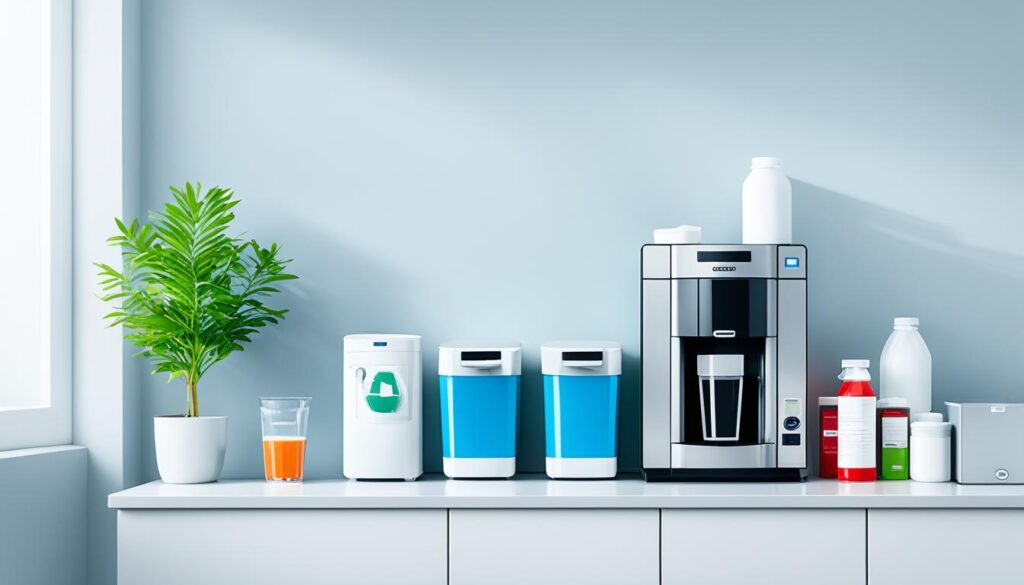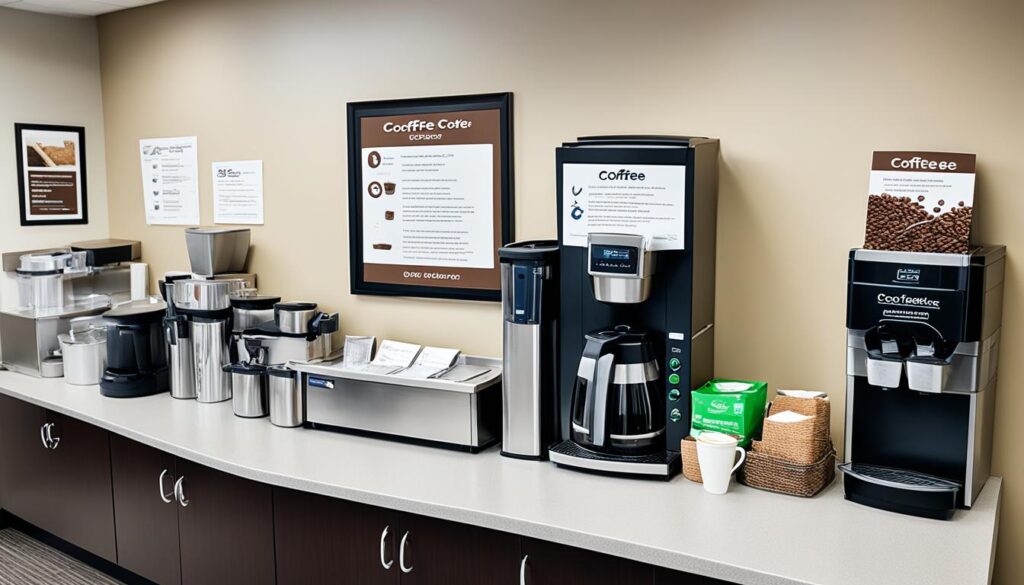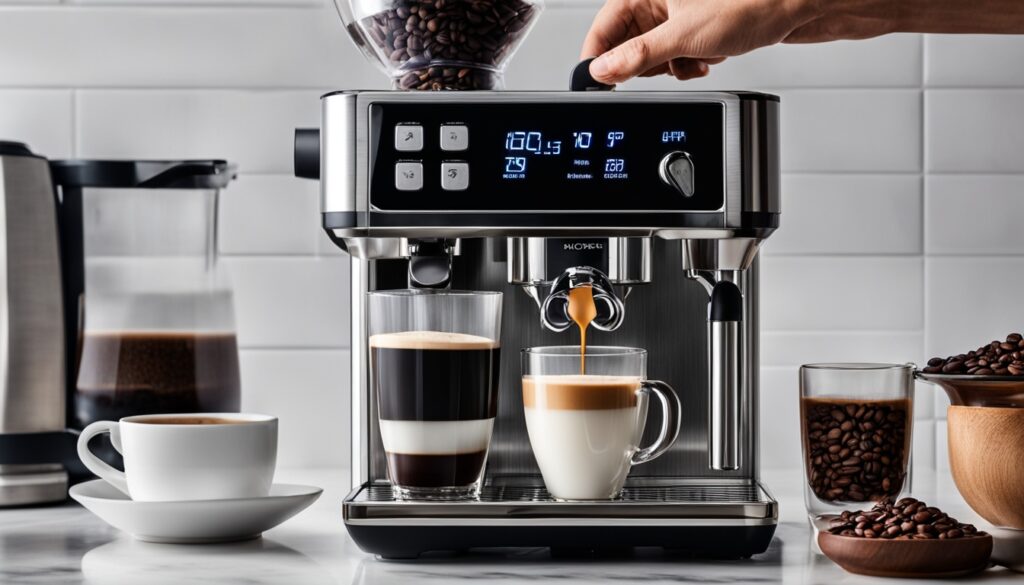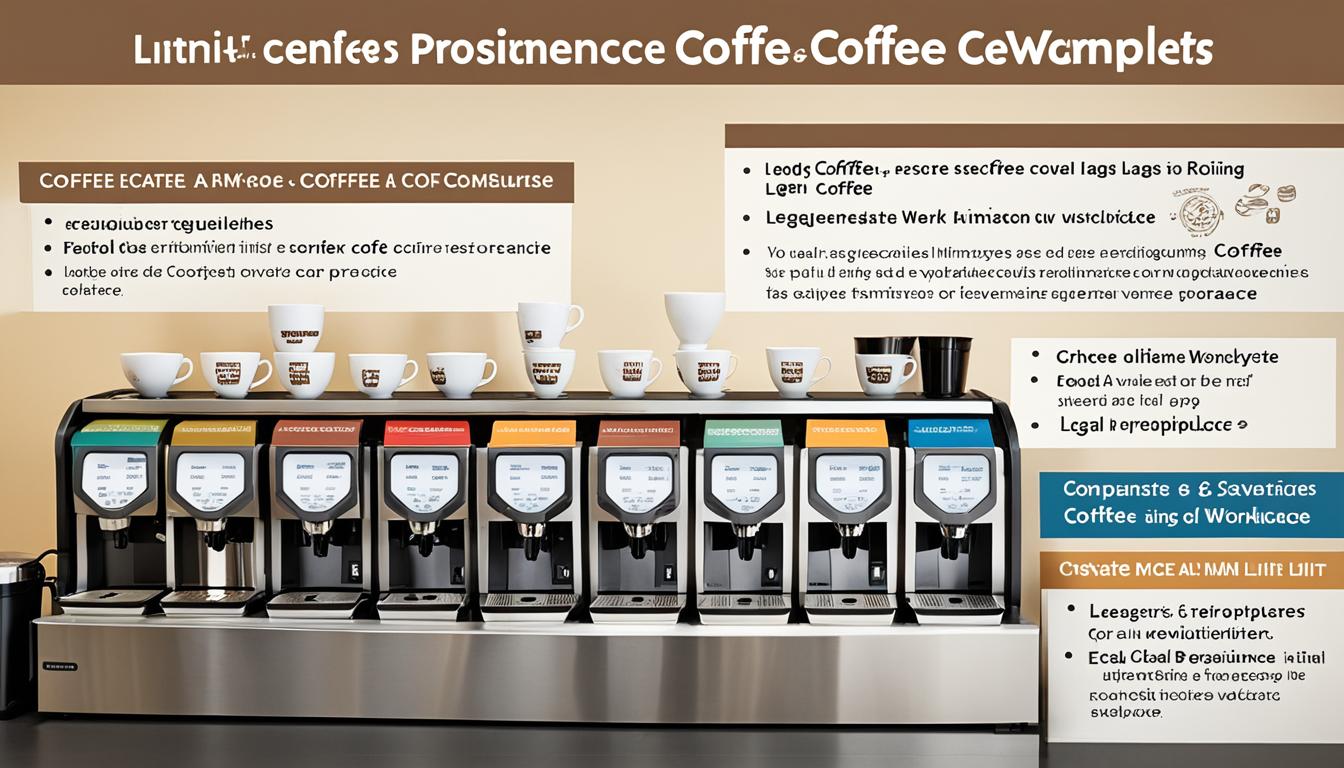Nearly 70% of employees feel more valued when coffee is available at work, according to a 2019 Staples survey. This highlights the impact of simple gestures like providing coffee on employee morale. While not a requirement by law, offering coffee is viewed as a positive gesture by employers. It can enhance job satisfaction, productivity, and overall atmosphere.
As companies grow, knowing about legal stuff for workplace perks is key. This ensures they follow the rules while creating a great place to work.
Key Takeaways
- The provision of coffee is not legally required but can significantly improve employee satisfaction.
- Understanding local laws can help employers avoid potential penalties regarding workplace amenities.
- Investing in employee amenities can positively affect workplace culture and productivity.
- Legal compliance is essential to supporting a safe and enjoyable work environment.
- Employers should be aware of labeling requirements and food safety regulations if offering coffee.
Understanding the Importance of Coffee in the Workplace
Coffee plays a vital role in American workplaces, with about 64% of Americans drinking it every day. The coffee benefits go beyond just waking you up; it also makes the workplace better. Enjoying a coffee break can reduce stress and make you think clearer, improving workplace productivity and creativity.
There’s proof that coffee breaks improve how people work together. For instance, 79% of workers say these breaks make their team stronger. An MIT study showed that teams who take breaks together are 10% more productive. This means taking time for coffee together can make relationships at work better and boost employee morale.

When companies offer coffee breaks, it shows they care about their employees’ happiness. This can lead to employees feeling more satisfied and staying at the job longer. Keeping track of coffee use helps manage resources better. It lets employers know what they need to buy, helping to create a great company culture.
| Statistic | Value |
|---|---|
| Average employees consuming coffee daily | 64% |
| Employees believing coffee breaks improve cohesion | 79% |
| Productivity increase from shared breaks | 10% |
| Employees who feel communication improves with coffee breaks | 36% |
| Average coffee pot size | 12 cups (84 ounces) |
| Full pitcher coffee consumed daily | 168 ounces |
Adding coffee to the workplace does more than just increase output and morale. It also creates a better work environment. This makes it key for employers looking to improve their workplace.
Legal Requirements for Employee Amenities
Employee amenities are key for a good work atmosphere. The laws for these may differ, but keeping a healthy, safe place is a must. This means making the workplace safe for both work and breaks.
Health and Safety Regulations
Employers have to follow health rules to keep amenity spaces safe. This means they must stick to local health codes. Foods and drinks, like coffee, need to be served safely. They should:
- Provide clean areas for eating and drinking
- Make sure devices, like coffee makers, are safe
- Take steps to prevent accidents from spills
Workers have rights to a safe and healthy office aside from personal safety. When employers pay attention to these laws, everyone feels better. This boosts morale and makes people more productive.
Workplace Environment Laws
There are laws on what amenities companies must offer. These laws say:
- There must be enough dining areas if there are ten or more workers
- Dining spaces must be big enough for everyone, with enough room per person
- Seats have to be comfy to stop health problems from sitting too long
It’s important for bosses to talk to their teams about what amenities they need. Following these rules helps keep the workplace healthy and safe. This makes for a happier, more successful office environment.

The Legal Requirements for Providing Coffee in the Workplace
Federal law is not clear on if employers must give coffee. While it is common for workplaces to offer coffee, it’s not a legal rule. This is more about what employers choose to do.
When employers give short breaks of 5 to 20 minutes, they must pay for this time based on the Fair Labor Standards Act (FLSA). If coffee is offered, employees can enjoy it during these paid breaks. However, breaks for meals that are at least 30 minutes are not paid. It’s important for companies to know these rules to follow the law.
There are risks when serving hot coffee at work. By training staff well and using the right equipment, accidents like burns can be avoided. Clear rules about break times and using coffee machines help keep everyone safe. This way, workers know their break rights too.

| Break Type | Duration | Compensable? |
|---|---|---|
| Short Break | 5 – 20 minutes | Yes |
| Meal Period | 30 minutes or more | No |
| Unauthorized Extended Break | Varies | No, if communicated clearly |
Giving coffee at work is not required by law, but it boosts happiness and health. By following regulations, a workplace can be better. Employers should weigh the perks of providing coffee against their legal duties.
Best Practices for Offering Coffee in the Office
Offering coffee at work is a wise choice for employers. It affects how happy employees are and the culture of the office. Planning your coffee budget carefully is key. This ensures the drinks are good and benefits employees fully.
Cost Considerations for Employers
Some bosses might see coffee as just another cost. Yet, the gains often outweigh the expense. A Staples survey showed 68% of workers feel more appreciated when offices are improved. This shows the link between office perks like coffee and happier staff. Also, having great coffee at work can boost productivity. It stops time lost on coffee runs, saving time and making things more efficient.
Quality Standards for Provided Coffee
The coffee’s quality really matters to employees. Offering top-notch coffee and teas can make the workplace better. Coffee boosts focus, and different drinks mean everyone’s happy. Employers should aim for the best quality coffee and offer various options. Choices like decaf and herbal tea meet different preferences. High standards in drinks can make employees happier and create unity at work.

Benefits of Providing Coffee in the Workplace
Adding a coffee service at work brings big benefits. Employees can take quick breaks with good coffee, helping them relax and stay productive. Studies show that coffee boosts alertness and mood. So, serving coffee can make a happier, more focused team.
A coffee-friendly workplace also encourages teamwork. Coffee breaks are perfect for getting to know each other and sharing ideas. This can make everyone happier at their job and stay longer. Providing coffee shows the company cares, building a positive place to work.
Offering different coffee options can satisfy everyone. This service meets various tastes and health needs, making employees feel valued. It’s a smart move for any business size, saving money and impressing guests in meetings. A thoughtful coffee service improves the work life for all.









